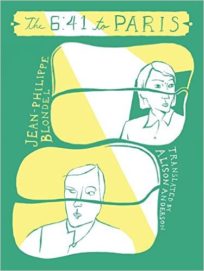 Jean-Phillippe Blondel
Jean-Phillippe Blondel
Translated by Alison Anderson
New Vessel Press ($14.95)
by Justin Goodman
The difference between suspense and surprise, to paraphrase Alfred Hitchcock, is the difference between the audience seeing the bomb before it detonates and no one seeing it. But unlike a multi-temporal medium such as film, where a bomb can march on a timeline parallel to a dinner party, literature's comparative limitations lead to surprise superseding suspense. Jean-Philippe Blondel's The 6:41 To Paris makes such a case, anyway. Translated in staccato format by Alison Anderson, this so-called “psychological thriller” grinds like a bullet train on 19th-century tracks, but despite the historical dynamism that propels the novel, it remains inescapably static and small in its design.
This is perhaps inevitable since the novel consists of the alternating asides of two exes unexpectedly forced to sit beside each other in a train compartment; they need to work their way through presque vu, then recognition, then embarrassment. When they first met at lyceé, twenty-seven years ago, Cécile was “just plain. Nothing striking. A bug,” and Philippe “was someone who at the age of twenty had never had any reason to complain.” After four months and a forebodingly oft-mentioned event in London (apparently twice warranting a melodramatic “Oh. My. God”) they broke-up, leading to a She's All That role reversal. She's now a handsome and successful entrepreneur, while he's an overweight salesman underselling his house after a divorce. While the tortoise syntax can be blamed on Anderson’s obsession with tight sentences, it’s more likely an attempt to mirror Blondel’s concern with how we construct the past.
Unfortunately, the attempt doesn’t quite come off. Unlike Henry James’s famously claustrophobic contemplation of Isabel Archer’s failed marriage in The Portrait of a Lady, Blondel demands an intimacy in tight spaces that doesn’t functionally exist. As one character meditates on a moment, so does the other on the exact same moment—but for two people closer to the last station of their life than the first, is this climactic, unfolding way of seeing the past reasonable? Forget that the supposedly surprising London event is not simply anti-climactic, but aggressively dull. This is a far cry from fiction that offers real psychology through piecemeal moments, from Jennifer Egan's A Visit from the Goon Squad to Junot Diaz's Drown; an even farther cry from the first writer to escape from the gloom of Isabel Archer’s morgue-like memory, Virginia Woolf, who wrote in her now famous essay “Mr. Bennett and Mrs. Brown” that “we must reconcile ourselves to a season of failures and fragments. We must reflect that where so much strength is spent on finding a way of telling the truth, the truth itself is bound to reach us in rather an exhausted and chaotic condition.”
The spaciousness and variety that matches the “chaotic condition” of truth is brilliantly displayed in Woolf, Egan, and Diaz, whereas in Blondel's The 6:41 to Paris, the world is as constrained and awkwardly focused as being forced to sit next to your ex on a train, grateful for the rare interruption of that independent moment—though when it comes, it looks out the window and sees its reflection instead of the world blurring by. It doesn’t, in the end, try to capture the world. Again, this is perfectly reflected in Anderson's tersely ungrammatical translation—too perfectly. At best, for both translator and author, it’s a pyrrhic victory.
What really makes Blondel’s book less interesting than those by the aforementioned writers, other than preferences of style, is the way the joints interlock. In using the flak of consciousness from outsiders to develop the arcs and byways of their characters’ thoughts, great authors of fragment depict those thoughts expanding like water slowly creeping across a rag. What is surprising is not necessarily what happened but why, and who's involved in the telling. The 6:41 to Paris is an interesting experiment in the ostensibly casual substance of isolation, but the result is best described by Cécile when the train doors closed: “the beginning of an egocentric and self-indulgent interlude.”
